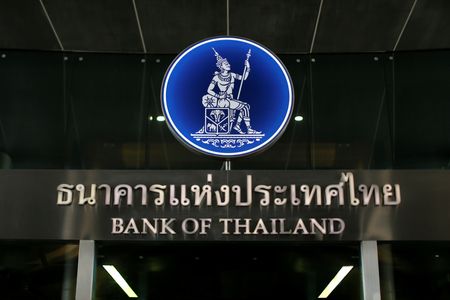By Orathai Sriring and Kitiphong Thaichareon
BANGKOK (Reuters) – Thailand’s central bank left its key interest rate at a record low on Wednesday, seeking to maintain support for a fragile economic recovery, and ruled out a need to adjust monetary policy for now despite a jump in inflation.
The Bank of Thailand’s (BOT) monetary policy committee unanimously voted to hold the one-day repurchase rate at 0.50% for a 14th straight meeting after three rate cuts in 2020. The rate decision was expected by all 23 analysts polled by Reuters.
“The committee assessed that the Thai economy in 2021 would expand faster than previously projected, and the recovery would continue into 2022 driven by higher merchandise exports, as well as a higher number of foreign tourist arrivals,” the BOT said in a statement after its first policy meeting of the year.
“However, the recovery would remain fragile and uneven across sectors, especially in tourism,” it said.
The BOT said monetary policy would remain accommodative to aid the economy, still its priority, though played down the economic impact the Omicron variant of the coronavirus would exert given the limited pressure on the health system.
While headline inflation would be higher than previously assessed and could exceed the target range in the early part of the year, the average inflation for full-2022 would remain within target range, the BOT said.
Inflation in January breached the BOT’s 1-3% target range, though assistant governor Piti Disyatat told a news conference “there was no need to adjust monetary policy yet”.
Most economists do not see rates rising for at least a year and some see an even more distant horizon.
Kobsidthi Silpachai, head of capital markets research of Kasikornbank, does not expect rates to rise until 2023 “once tourism improves sufficiently to have direct and indirect effects on income, wages, and inflation”.
Capital Economics predicts rates will be left unchanged until the end of 2023.
While the latest coronavirus outbreak had slowed economic activity early in the year, Thai authorities have been trying to kickstart the critical foreign tourism sector, which normally accounts for about 12% of gross domestic product.
Nearly 40 million people visited Thailand in 2019 before the pandemic, but this slumped in 2020 after borders shut and as a reopening started edged up to 428,000 last year.
The BOT has forecast economic growth of 3.4% this year, with 5.6 million foreign tourists visiting the country.
(Reporting by Orathai Sriring, Kitiphong Thaichareon and Satawasin Staporncharnchai; Editing by Ed davies)











